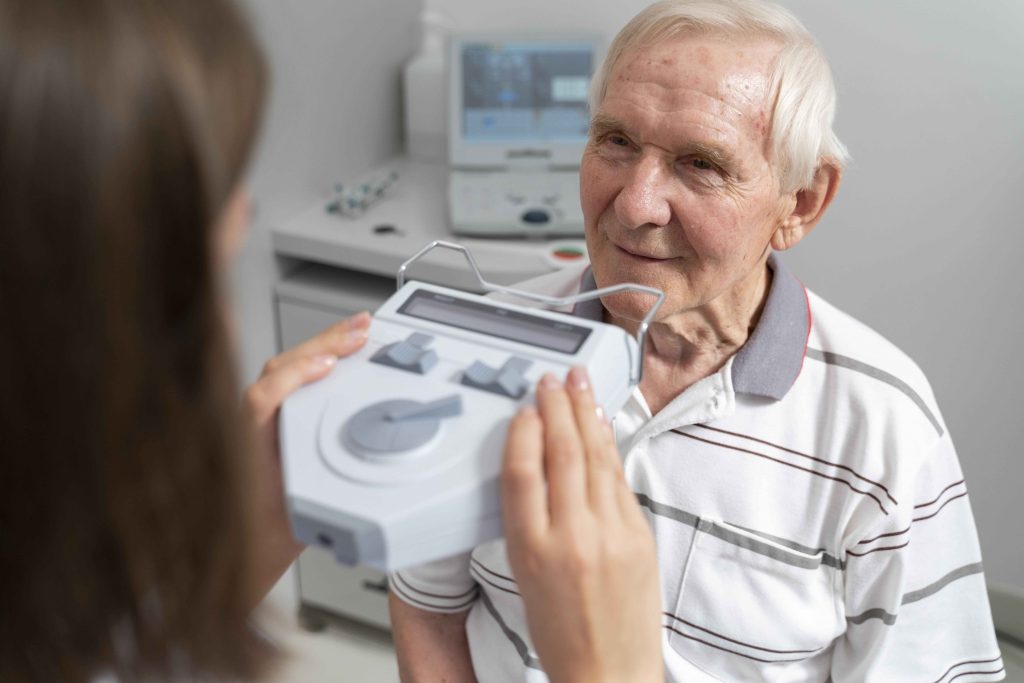CATARACT AWARENESS: UNDERSTANDING SYMPTOMS AND PREVENTION
What is a Cataract?
Cataract is one of the most common eye conditions that progresses slowly. They develop when the lens of the eye, which is normally clear, becomes cloudy. This cloudiness impairs vision by reducing the amount of light entering the eye and reaching the retina(the innermost layer of the eye).

Types of cataracts
Primarily, there are three types of cataracts:
- Nuclear sclerosis cataract- In this condition, the central part of the eye lens (nucleus) gets cloudy, yellow, and hard.
- Cortical cataract- This cataract occurs due to overhydration. Wedge shape opacities develop in the edges of the lens. Stages of cortical cataract appear when they gradually progress towards the center of the lens.
- Posterior Subcapsular cataract- The innermost layer of lens becomes opacified giving a very high amount of vision loss.
What are the causes of cataracts?
Most people find this problem reaching the age of 50-60. However, some other factors also
contribute to the development of cataracts:
Eye injury: Eye injury damages the crystalline lens and changes the lens fiber.
Excessive exposure to ultraviolet (UV) rays: UV rays can affect the DNA and change the eye lens’s protein structure.
Smoking: Smoking causes oxidation in eye lenses, contributing to eye lens physiology change.
Using steroids for longer periods: Long-term use and high doses of steroids can cause Subcapsular cataracts.
What are the symptoms of cataracts?
Some of the common symptoms are:
Diminision of vision: Cataracts block the passage of light toward the retina.
Light sensitivity: Scattered light reaches the retina, and it is bright.
Double vision: The outcoming light is scattered through the cloudy buildup, which sometimes causes the formation of multiple but unclear images.
Difficulty in seeing during the night: More light is required for scattering and image formation in darkness.
Seeing halos around lights: The light becomes diffracted due to a cloudy lens, and Halos around light is created.
How can one detect cataracts in the early stage?
How does one detect cataracts in the early stage? Sounds like an interesting question.
In the early stage, cataract is unnoticeable. A cloudy, dim, or blurred vision starts developing gradually. The vision seems
- Like seeing through foggy weather.
- Started finding difficulty in reading.
- Need for bright light to do activities.
- Slowly losing night vision.
To detect cataracts in the early stage, it’s important to identify their occurrence.

Cataract prevention
We can reduce the risk of cataracts and slow down their progression with:
- Regular Eye Exams: Optometrists and ophthalmologists can spot cataracts in early stages through routine eye check-ups, using tests like visual acuity and slit-lamp exams.
- Symptom Awareness: Be vigilant for signs like blurred vision, night vision difficulties, or glare sensitivity, and seek immediate consultation if any symptoms arise.
- Risk Factors: Those over 60, diabetics, sun-exposed individuals, or those with a family history of cataracts should have regular eye check-ups.
- Lifestyle Adjustments: Early-stage cataract management can involve brighter lighting, anti-glare sunglasses, and updated eyeglass prescriptions to improve vision quality temporarily, including a diet rich in vitamins A, C, and E.
- Early detection and management: This includes surgery to replace the clouded lens with an artificial one, which can Improve vision and quality of life for cataract patients.
How to cure your eyes with cataract surgery?
Cataracts can only be treated by surgery. The cataract lens is vacuumed out, and an artificial lens is inserted. An intraocular lens (artificial lens) is put in the place of a natural lens and remains permanent.
Book an appointment with Krishna Eye Centre Mumbai for the best cataract surgery
Krishna Eye Centre is known for its exceptional services in all kinds of eye and Cataract services.
Our team is well-versed and holds end-to-end expertise in all advanced Cataract surgery techniques.
Our Eye doctors have performed more than 20,000 successful surgeries.
Krishna Eye Center can be your savior if you suffer from cataracts and want your vision back.
